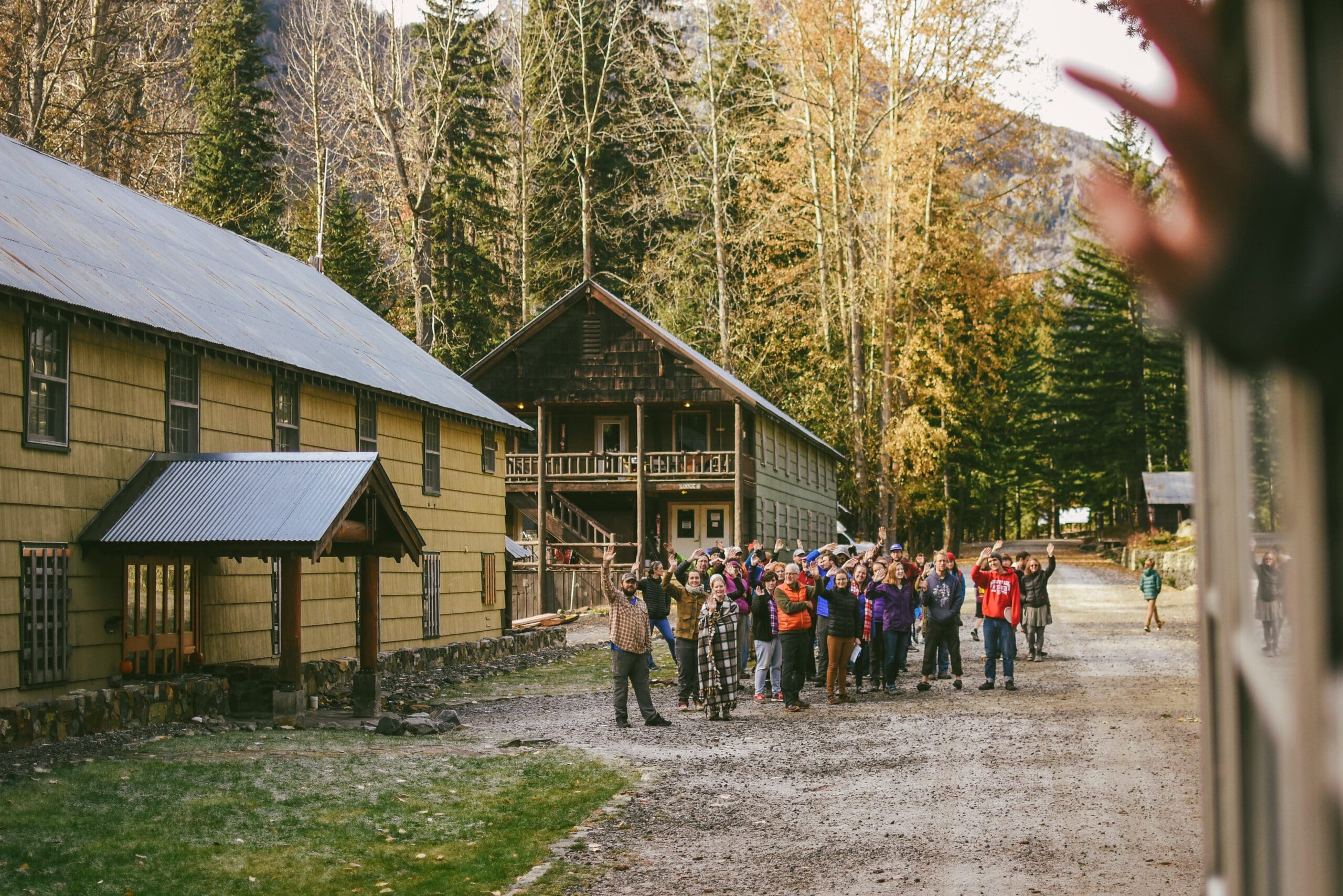I
It’s a dusty, twelve-mile ride, and the ambling old school bus awkwardly negotiates hair-raising switchbacks as the Railroad Creek valley drops to meet Lake Chelan, the first leg of a long journey out of the wilderness and back to civilization. My two weeks at Holden Village have come to an end. This is my fourth visit: I first came to this Christian retreat centre with my family in the summer of 2017, staying as guests and quickly falling in love with the place; I returned in subsequent visits as a short-term staff member, once as village musician, twice as carpenter. By now the down-mountain trip feels familiar, as do the gentle tears that punctuate my ride. Holden is a special place, and it’s hard to leave.
My tears may appear sentimental, and to be sure I’m stirred by the bittersweet, too-soon surrender of relationships made, bonds formed, and experiences treasured. But I’m also overcome by something deeper: the feeling of having glimpsed a vision of the world as it once was—the world as it could be and as it should be. Holden is a place animated by ancient truths and ancient practices; there is something, in a word, conservative about this visionary, progressive community. So with each visit, with each wistful departure, I ponder how the world might be more “Holden”—and how Holden can resist becoming more worldly. I also find myself pondering timely questions about the nature of progressive Christianity, Christian institutions, and their role in American life.
History and Place
Holden is the fruit of imagination—or, better, of two unrelated leaps of faith. The first chapter of Holden’s history is attested by Buckskin Mountain and Copper Mountain, rising magnificently to the south: the town infrastructure was built in 1938 to support a fledgling mining operation. In spite of its isolation and the estimable transportation challenges presented by the daunting terrain, the mine thrived for a time, as did the town, which housed as many as six hundred at the height of operations. Now, decades after the mine’s closure in 1957, most of the original structures continue to serve new generations of occupants. This second, longer chapter in the life of Holden took shape largely thanks to the bold vision of Wes Prieb, who proposed and then negotiated the wholesale donation of Holden’s vacant facilities to the Seattle-based Lutheran Bible Institute. Although the specifics would be worked out by others, Prieb envisioned a place dedicated “to the honor and glory of God.” In 1961 a regiment of Lutheran volunteers—the lifeblood of Holden ever since—went about refurbishing the abandoned buildings and preparing the way for intentional communal living inspired by Christian foundations. Holden Village as we now know it was born, and visitors have been flocking there ever since.
The village is nestled in a steep valley forged by Railroad Creek—so named after plans for rail access into this severe topography within the Wenatchee National Forest. As it happens, those plans never materialized, and there remains no direct vehicular access to Holden. Instead, from humble Chelan, Washington, it takes a three-hour boat ride up Lake Chelan to the lonely dock where a Holden-operated school bus collects travellers and then slowly climbs into the wilderness along a dirt road, ascending two thousand feet of elevation before arriving in the village itself.
Each such arrival is greeted by a mob of current residents who wave, hold signs, applaud, holler, and sway to the improvised rhythms of hand drums. This practice, a proud tradition among the villagers, offers both a celebratory welcome for the weary traveller and, more deeply, a sort of ritual of initiation into the community. First-timers are happily bewildered by the reception, while veterans feel a reassuring sense of homecoming. The veterans tend to be in the majority: this is a pilgrimage that inspires return visits, often blossoming into regular, multi-generational family commitments.
Rest, Retreat, Renewal
Visitors are drawn to this special place for a number of reasons, but in the end, Holden is a getaway: a place for rest, retreat, and renewal. Despite a few notable reminders of modernity—hydro-powered electricity, indoor plumbing, and a small fleet of vehicles and heavy machinery—this could still be the 1930s, or even decades earlier. The internet is essentially inaccessible to guests. In fact, virtually all forms of mass media other than those that would have been familiar in the mining days are absent. The library computer does ostensibly grant emergency access to the digital world, though in truth its internet is impractically slow. And lest its users lose sight of village priorities, that access requires a brilliantly sardonic login/password pair: ICameToTheWilderness / ToCheckEmail.
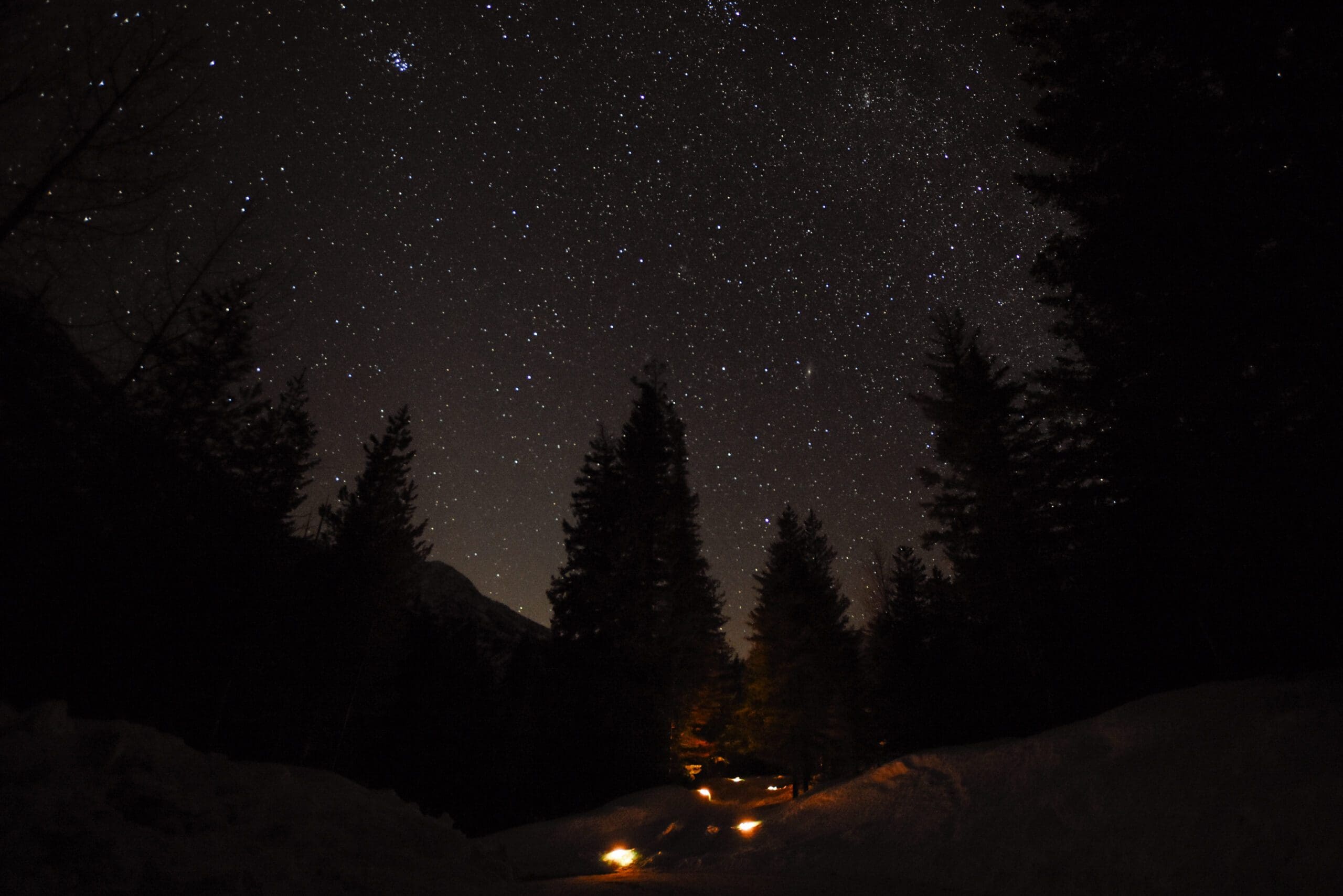
No, the pleasures of Holden are decidedly pre-information-age, starting with the pleasures of the natural world—the mountains that were the original raison d’être of this former mining outpost. Hiking trails of all sorts are a favourite diversion, and even a half-day hike will easily put you two thousand glorious feet above the village; in a longer day, trekkers have their pick of impressive peaks, glaciers, alpine meadows, and mountain lakes. Families of deer are an almost constant sight, wandering nonchalantly through the village and lazily munching the grasses and clover of the modest lawns. Some of them sample the lilies lovingly nurtured by the lawn-and-gardens staff, and no one stops them: this is their land. Somewhat more notable are the bears. The natural world—and a reminder of our place in it—is ever present. Relatedly, villagers are acutely mindful of their impact; great thought is given to the reduction, reuse, and recycling of waste, especially in the dining hall, where plates are licked clean and scraps meticulously scraped into compost bins.
The basement of the Village Center offers ping-pong, foosball, pool tables, board games, a popcorn machine, and a thirties-era bowling alley—still in working order thanks to ingenious jury-rigging. Its easygoing denizens come and go to the soundtrack of a jukebox that, though often commandeered by the youngsters, caters to a happily intergenerational audience. Outside, casual games of hacky sack, Frisbee, or basketball provide further outlet.
Rather in the spirit of the nineteenth-century Chautauqua tradition, an important part of the Holden experience for many guests is the opportunity for edification through learning and creativity. Faculty lead low-stakes but serious and beloved classes, discussions, and lectures on a variety of topics of broad interest to progressive Christians: Bible and theology, social justice, arts and letters, politics, environmental sciences and sustainability, and so forth. Health and wellness are pursued at leisure through yoga, Shibashi, Tai Chi, and other practices. A resident pastor might direct a session of scriptural study, and staff in the Craft Cave give as little or as much help as guests need in completing art projects, from painting to ceramics to weaving.
Parenting, especially of teenagers, is something of a revelation at Holden. On the one hand, there is virtually nothing a parent needs to do here, certainly nothing to worry about: no schlepping or organizing, no concerns about bad influences or questionable plans, no traffic or other physical dangers (bears aside). Gaggles quickly form and wander off, seldom to be seen again until the end of the week. It is how children everywhere have always wanted to live. So parents become, in a sense, redundant. On the other hand, parents are everywhere (“It takes a village”). Nowhere have I seen such easy intergenerational co-mingling as I’ve seen at Holden—a fact of life through most of human history, but increasingly an anomaly in modern America.
With each visit, with each wistful departure, I ponder how the world might be more “Holden”—and how Holden can resist becoming more worldly.
Mealtime is easy, open, noisy. Diners sit where they will, without preconception or agenda, and without the hurried pressure for “quality time” that sometimes underlies socializing in our overly busy lives elsewhere. Like so much else at Holden, the food (served buffet-style) is modest but full of love and care—frequently delicious and always satisfying. It is, in a word, real. There is no outsourced, processed, or packaged food. Soda will never pass your lips. Leftovers reappear through ingenious reincarnation, in honour of an obsessive aversion to waste. Snackers find fresh-baked bread with jams and butters always on hand, as well as irresistible homemade granola. Occasionally a fresh-baked item might appear midway through the morning, and word quickly spreads through the village if the fragrance doesn’t first. The aforementioned intergenerational default is most apparent here in the dining hall, where there is an unspoken aversion to cliques. The kitchen’s food philosophy—an actual document that invokes such words as “sacramental,” “grace,” “love,” “the sacred,” “prophetic”—inspires all the elements of dining at Holden, from food to community to ethics.
At the end of the day, a line snakes around the corner from the ice cream parlour, and villagers chat while taking in the pleasant mountain evening. Ice cream (of high quality) is a mere dollar a scoop, and the scoops are downright extravagant. And while I don’t recall the point ever being made explicitly, I infer from this generosity not only a subversive anti-capitalist impulse but more importantly a theological lesson in grace—a parable, enacted communally night after night, about undeserved abundance freely given and gratefully received.
Afterward, some congregate in the dining hall for conversation, cards, or a board game; others head to the Village Center for a game of pool; some sit outside gazing at the nocturnal mountain silhouette imperceptibly ripening in the south; a devoted weaver might head to the Craft Cave; some browse the library for literary companionship.
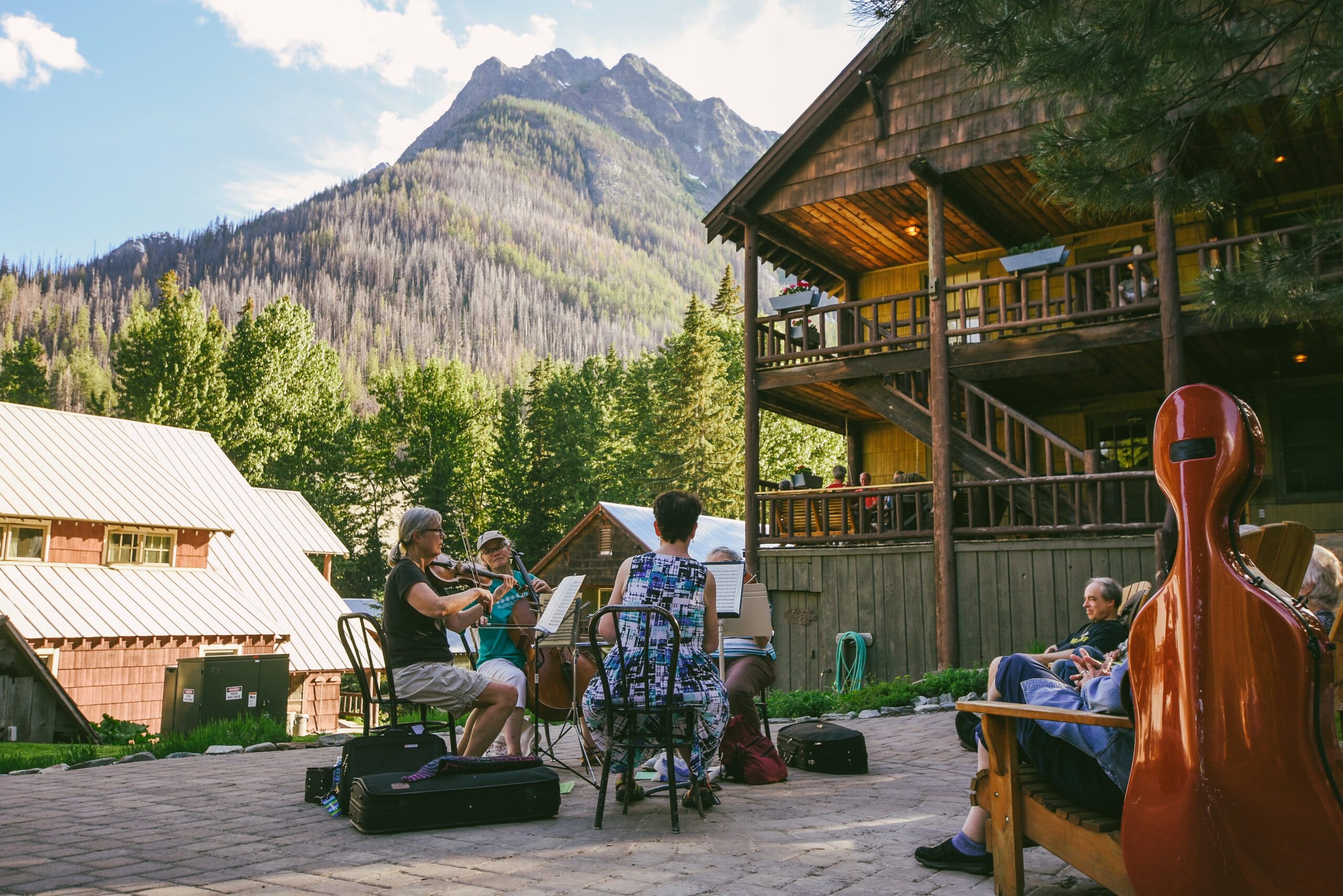
But the real action, in my opinion, is on the porch when the guitars come out. Each of the “lodges” (two-storey dormitories for guests and short-term staff) and the “chalets” (smaller, shared houses for faculty and longer-term staff) sport modest porches, well worn from years of avid use. In fact, it was with great pride last summer that I joined the new Porch Project initiative, a multi-year restoration of those eighty-year-old spaces to exacting, historically sensitive standards. No mere suburban architectural focal points, these porches are the unofficial social centres of the village. They afford spectacular views, unplanned conversation, and, especially at night, spontaneous music-making. I have had some of my most musically thrilling experiences on Holden’s porches, collaborating with near-strangers. A guitar might set things off, but before long other instruments appear—a fiddle, a mandolin, perhaps a banjo or dobro. Singers sing. Chatters chat. A starry sky emerges. Quiet hour comes too quickly but is observed with all due respect.
Work
A large portion of the village—in some months, the entirety of the village—consists of short- and long-term staff. But somehow, the term “staff” always strikes me as somewhat inadequate. I find it makes more sense to think of these energetic, eclectic folks as “residents,” the hard-working populace of a self-sufficient little pre-industrial town: cooks, bakers, cleaners, carpenters, painters, gardeners, foresters, artisans, shopkeepers, teachers, musicians, doctors, firefighters, drivers and mechanics, a pastor or two, and a band of dedicated do-it-alls affectionately known as “mavericks.” The work, no matter how mundane, is carried out with pride and enthusiasm, its meaning and importance unquestionable; nothing in the daily operation of this remote facility can be taken for granted but rather depends on the cooperation, toil, and expertise of the community itself. On top of their particular vocational assignments, all staff members, from the executive directors on down, are assigned regular slots on the Dish Team and the waste-management protocol known as Garbology. In this way, while hierarchy is certainly a necessary part of village life, that hierarchy is gleefully subverted with almost biblical eloquence.
During the summer months, staffing expands as residency grows and as hospitality and programming take more of the focus. This includes a rotating slate of guest musicians and faculty, who contribute to a kaleidoscopic menu of programming. Even with an influx of guests, though, the village never completely loses its character of a self-sufficient ecosystem. For while the guests’ comfort is a priority, Holden is always first of all a community. The trappings of the hospitality industry are utterly foreign. Indeed, the division between staff and guests is strangely de-emphasized: there is no screen behind which the magic happens, but rather a constant, ever-present pulse of industriousness.
Many of the staff occupy several roles, whether official or otherwise: the chainsaw-wielding trail-tamer also serves as medic and school teacher; the operations manager calls contra dances; the business manager plays gospel piano; the A/V coordinator climbs mountains and is the go-to source for adventure planning; the crafts coordinator has a degree in architecture and advises on proposals for a new playground. This is a place where you keenly feel the value of your labour but where your “job” doesn’t fully define your personhood.
Prayer
Holden prays. A prayer of thanksgiving is offered at every meal, whether curated from the microphone prior to announcements or read collectively from prayer cards at each table’s centrepiece. Touchingly, departing villagers receive a prayer of sending; and staff, upon completing their terms, are likewise offered a “prayer of good courage.” But for me, the most distinctive and meaningful aspect of Holden—the thing that looms most romantically in my memory long after the tears of departure have dried—is the practice of nightly Vespers.
For most churchgoers in America, worship life tends to be a weekly, and typically a morning, affair. But it must be said that the practice, for all its biblical foundations, commands rather too little of our attention, especially in a modern world so brimming with banality, distraction, and temptation. It’s all too easy to compartmentalize our Sundays from the other six-sevenths of our lives. And so I find profound wisdom and comfort in the ancient monastic mindset, which incorporates prayer into not only a weekly but also a daily routine. The practice of Vespers—a short evening liturgy—provides a welcome contrast to the perhaps overly familiar Christian customs of Sunday morning. Historically, Vespers is brief, with no sermon; like other services of the Divine Office (which originated in pre-Christian Jewish custom), it puts its trust in simplicity and predictability, eschewing both preacherly charisma (per Protestant worship) and sacramental transcendence (per Catholic Mass). Moreover, Vespers, strictly speaking, is an entirely sung form of prayer (Anglicans call it “Evensong”); as religious practitioners throughout the ages have understood, mere speech is inadequate to divine tasks. And by virtue of its timing—the end of an ordinary day of work rather than the beginning of an un-ordinary day of rest—Vespers occasions a very different psychological state among the participants: settled, open . . . in a word, prayerful.
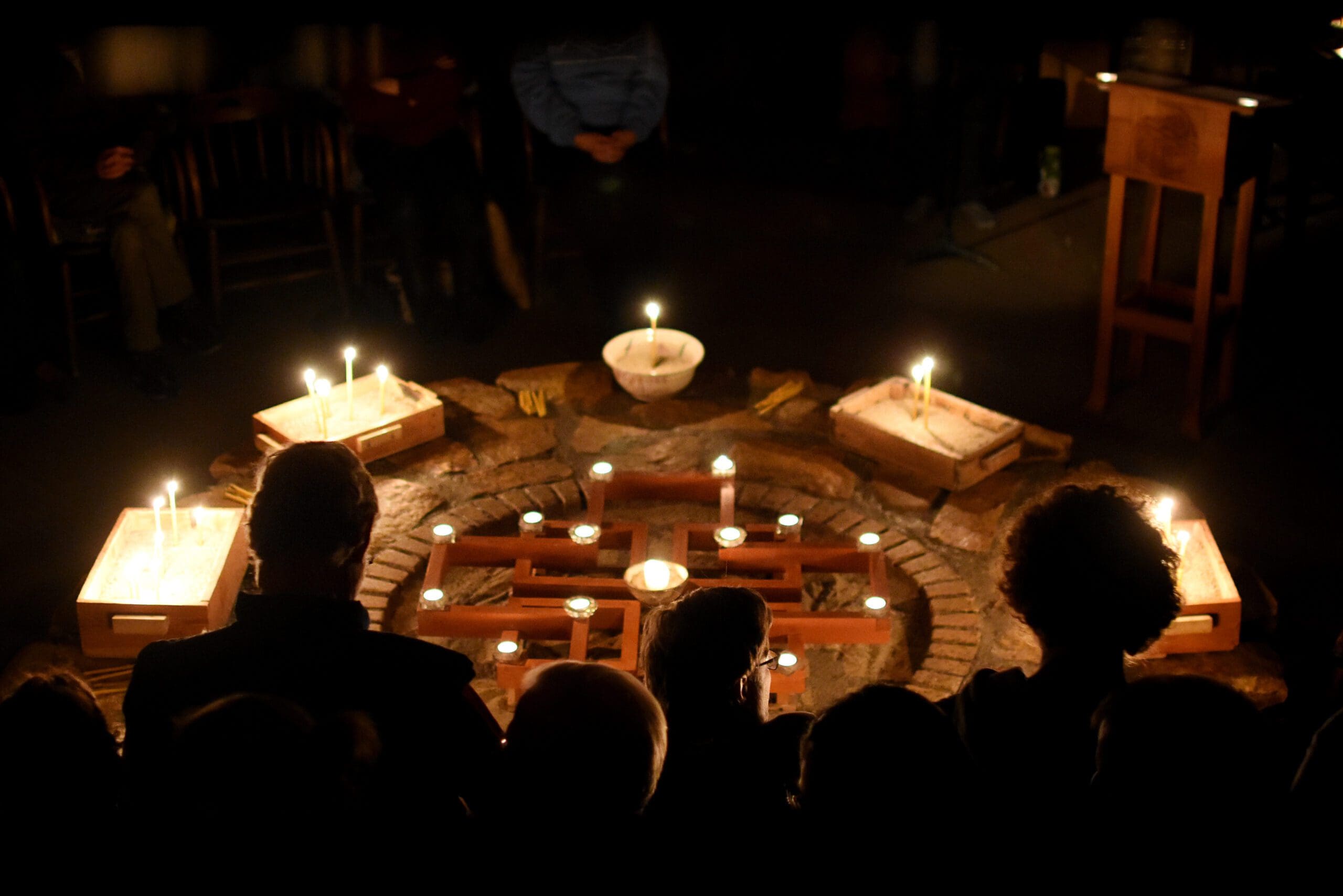
Again, for most modern American churchgoers (and perhaps for mainline Protestants in particular), regular churchgoing can also be a somewhat negotiable commitment, subject to personal considerations and in any case lacking (for better or worse) the moral burden of Catholic-style “days of obligation.” By contrast, since the earliest days at Holden, attendance at Vespers has been an explicit community expectation—a covenant of sorts—and this I find a truly beautiful thing. Even in a close-knit community, where meals, work, and physical and social spaces are widely shared, it is inspiring to know that the entire community will gather once a day, and for a purpose beyond any physical or practical need. In one sense, the village shuts down: naturally, nothing is scheduled during Vespers. In another sense, the village opens wide: the community is enlarged and emboldened by this nightly reminder of a common mission, a common past, and a common hope that transcend time and place. Vespers underscores and consecrates the day just ended. Individuals are strengthened, at least as their spirits allow on any given day: some will come in joy, others in mourning; some will come full of faith, others stumbling in faith, and still others timidly beginning a journey of faith. (Have not all Christians, at one time or another, fit each of those descriptions?) But even more does the covenant of Vespers strengthen the community, tying soul to soul and to the larger world of Christendom, enacting community through an act of communing.
In practice, the form and even the mood of Vespers at Holden often has little in common with the ancient service, with one notable exception: the regular singing of Marty Haugen’s “Holden Evening Prayer.” Haugen is a stalwart fixture in Lutheran musical circles, abundantly represented in modern hymnals, Protestant and Catholic alike. And in 1985–1986, while a resident musician at Holden, Haugen added his voice to a vast tradition of Vespers settings—a tradition beginning anonymously from within the walls of medieval monasteries and extending to Vivaldi, Mozart, Bruckner, and beyond. He dedicated the piece to “the people of the Winter Community at Holden.”
Haugen’s “Holden Evening Prayer” is a wholly pleasant work, congregationally friendly, with moments of brilliance—notably, the solemn yet restless canon “Let my prayer rise up like incense” (Psalm 141), which I always savour. Known locally as “Vespers ’86,” the piece quickly outgrew its original context. I myself first encountered it in a church in Ithaca, New York; and from my years as a postdoc at Valparaiso University, I fondly remember its use in packed, smoke-filled, student-led candlelight services. (What, I wondered, was this “community at Holden”?) Naturally, it has become a mainstay of the Holden Vespers tradition as well, a beloved “must-sing” in a weekly rotation of various forms and themes for evening prayer. And when Holden sings the well-known piece, how they sing! I defy even the hardest of hearts not to be moved.
By virtue of its timing—the end of an ordinary day of work rather than the beginning of an un-ordinary day of rest—Vespers occasions a very different psychological state among the participants: settled, open . . . in a word, prayerful.
Another notable Vespers setting that has earned proud devotion among the village is Kent Gustavson’s “Mountain Vespers,” a lively bluegrass take on the service that inspires a rafter-rattling profusion of village instrumentalists. At the other end of the emotional spectrum, and quite distinct from the conventional order of Vespers per se, is the Holden tradition of “Prayer Around the Cross,” a contemplative, relatively free-form service of Taizé-style chanting, in which worshippers, ad libitum, may approach a central cross to kneel, pray, light a candle, and give or receive a laying on of hands—a simple and indescribably moving practice.
Other evening services at Holden follow more ad hoc forms, which I confess I typically find less inspiring. PowerPoint, alas, has become something of a fixture, too often reducing liturgy to mere script. And service planners, albeit with the best of intentions, sometimes veer toward intercultural (and even interfaith) pantheism, or social-justice-tinged smorgasbords of word and song. In the end, I have to admit that I’ve always been a rather peevish congregant, frequently dissatisfied with church services in practice. But here at Holden I try to embrace the variety and to honour the populist ethos underlying it. And somehow I take comfort even in my failure to do so, happy that my participation in the village’s prayer life—a communal prayer life—connects to something beyond my own idiosyncratic needs, desires, or sensibilities. Nevertheless, these pluralistic tendencies point to contradictions and tensions inherent in progressive Christianity that, if not managed wisely, could very well undermine Holden’s character and future.
Worries, Prophecies
The current incarnation of Holden Village has far surpassed, in longevity, the mining town from which it sprang. But these sixty years have not been without existential challenges. One spectacular challenge—the Wolverine Creek Wildfire—was narrowly (many will say providentially) averted in 2015, during the first months of a transition to new executive directors. Uncannily, five years later another leadership transition coincided with the COVID-19 pandemic. But even without fire or plague, Holden’s continued success is far from inevitable.
One singular challenge—though partly an imagined one, depending on your point of view—concerns Holden’s place in a modern, multicultural America. Holden finds itself, naturally and rightly, worried about inclusion and relevance: in an era of increasing pluralism (and, arguably, secularism), can this place continue to be sustainable as a “Lutheran renewal center”? As it happens, that very phrase, which appears in Google’s blurb for Holden Village and in various third-party references, has become vestigial: it currently appears nowhere on holdenvillage.org itself, though it presumably originates in some official Holden verbiage of yore.
Holden is indeed undergoing an appraisal of its identity, if not an outright crisis of identity. This is articulated directly in the first goal of its 2020–2025 strategic plan: “To clearly define ourselves as we prepare to reach out to more diverse constituencies.” This seems a very wise combination of objectives—to both define and to reach out—and a particularly difficult needle to thread. It is the same precarious balance challenging churches all across America, and one that challenged, and in the end confounded, Christian higher education generations ago. I greatly admire and appreciate those who answer the challenge. But I bemoan the predictable, well-intentioned response in which outreach overwhelms identity. I have attended services at some mainline Protestant churches in recent years that feel more akin to Rotary Club meetings, others more akin to poetry readings, and still others more akin to activist rallies than anything I recognize as Christian liturgy. Outreach unfortunately tends to flatten a potentially mystical experience into something familiar, finite, self-absorbed, and even self-satisfied—in short, it tends to secularize the sacred. The desire to be all things to all people will leave any institution hollow and soulless, whereas a true act of welcoming, if it is earnest and loving, is an act of welcoming into—that is, into something of value. Welcoming only for the sake of welcoming ends in narcissism and futility.
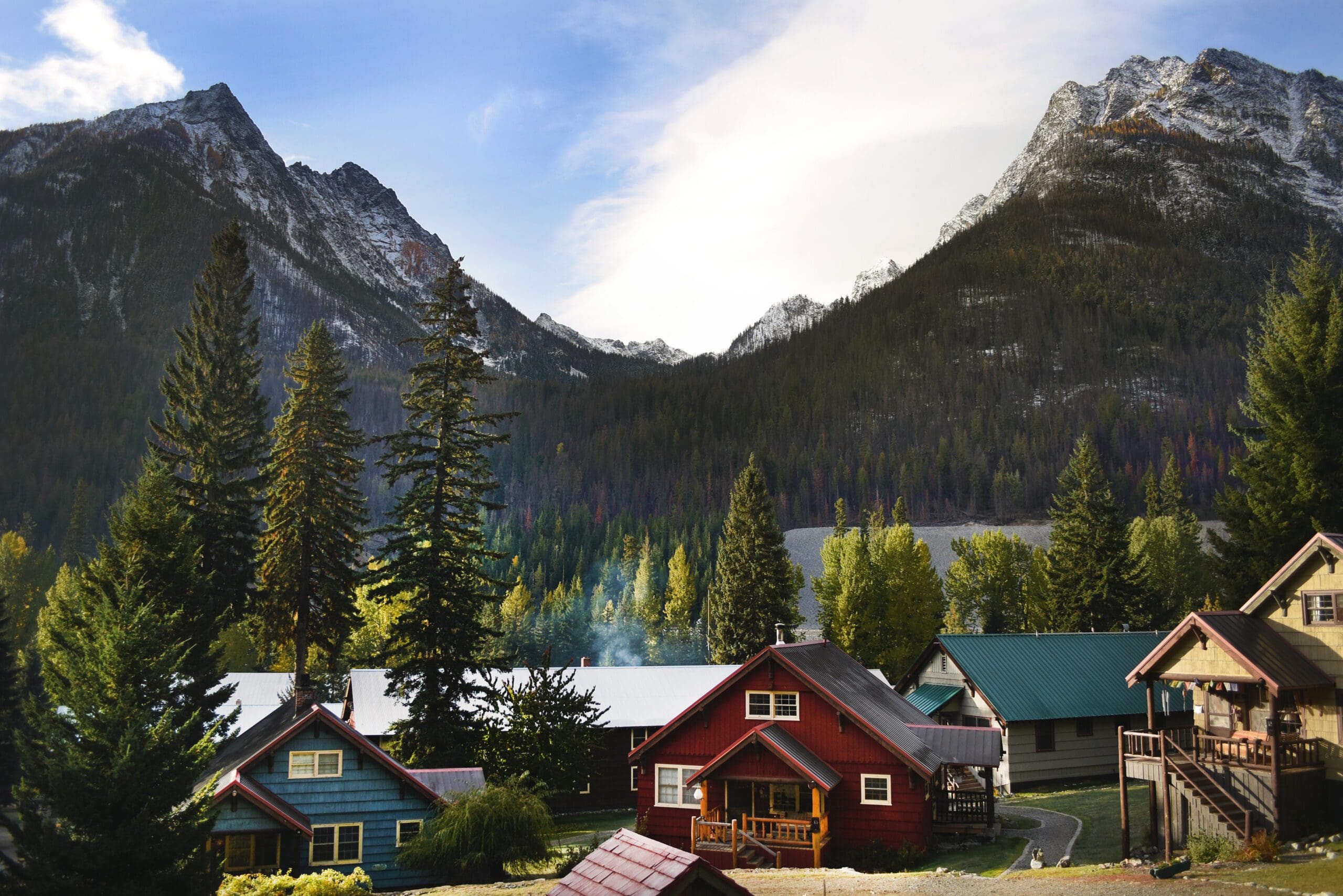
Two specific recent innovations at Holden especially pique these worries of mine. First, Vespers has been rebranded as “Sacred Space.” The change seems innocent enough, but I find myself contemplating the motivations and imagining far-reaching ramifications. I sense a retreat from tradition, indeed even from a rich living tradition such as Holden’s; I sense a naive embarrassment at the trappings of institutional Christianity; I sense a lack of trust in the curiosity and openness of the uninitiated. (“Most people don’t even know what ‘Vespers’ is,” I was told, by way of justification for the change.) Am I sensing, like the proverbial canary in a coal mine, a silent, gathering crisis? “Sacred Space” may not offend or alienate, but neither does it signify something distinctive or meaningful: those words and similar ones are used by college chaplains across the country in the hope of reaching student bodies presumed to be “spiritual but not religious.” Is that where Holden is heading, deliberately or otherwise?
“Sacred Space” may not offend or alienate, but neither does it signify something distinctive or meaningful.
A second recent change is much more significant: the abandonment of Holden’s long-standing covenant of daily attendance at worship. This I find disappointing and distressing: Holden’s committed practice of communal worship strikes me as the very linchpin of its identity and community life. To be sure, there will always be those (myself included) who might, on any given evening, find the commitment more burden than joy; and more broadly speaking, Holden’s populace is not exclusively Christian (certainly not exclusively Lutheran). But to honour Vespers as a fact rather than a choice is to proclaim a community identity. It is to affirm the unique character and makeup of this community—historically, a combination of Lutherans, Lutheran allies, and the Lutheran-curious (or at least Christians, Christian allies, and the Christian-curious). To accept non-attendance as a viable option may well end in normalizing it. I worry that someday worship will become just as optional as morning yoga or a nature walk. And hastening that descent down a slippery slope will be a subtle demographic shift, first among staff and ultimately among guests: as a diverse set of religious and a-religious perspectives are “welcomed,” the Christian premise of the place might increasingly seem tenuous or even incongruous. An optional “Sacred Space” may open certain doors, but it surely closes other doors. Will traditionalists feel welcome in such a space? Will anyone notice? Will anyone care? I suspect not.
Under the pressure of such theological and cultural erosion, what might Holden’s identity be? It will still be a place of great natural beauty, where environmental and social justice are taught, learned, and practiced. It could still be a haven for vegetarians and Luddites. It might even still be a model of communal living. All wonderful things. But to my mind the most distinctive aspect of Holden’s identity is its unabashed Christian conviction, from which flow all those other noble (but in principle secular) elements, and more. At best, a retreat from its Christian foundation will leave Holden without a clear and unifying identity; at worst, it will leave Holden lifeless and empty—barren branches starved of the sustaining vigour of trunk and root. A house built on sand.
A Voice in the Wilderness
My long journey out of the wilderness and back to civilization is now behind me—the dusty bus ride, the slow boat to Chelan, the bus to Wenatchee and taxi to tiny Pangborn Airport, the flights to Seattle, then Denver, then Albany, the recovery of my car from long-term parking, the drive up I-87, the automatic garage-door opener, the key in the front door, the relief of air conditioning.
But what to make of this, the “real world”? It has so little in common with the immersive experience of my last two weeks. It is a world of alienation, where fences are built and porches neglected. It is a world of unceasing information and digital connection, most of it worse than useless. A world of shameful excess, gluttonous desires, and prodigious waste. Commodified work and commodified leisure. Consumption rather than production; critique rather than creativity; asphalt and automation rather than soil and sweat. It is also a world torn asunder by pettiness and polarization. And above all—is this cause or effect?—ours is a world in which religion is too often compartmentalized in time and place, a provisional and private matter of psychology or identity rather than the warp and weft of daily life. A proposition rather than a lifestyle. An accessory rather than a heartbeat.
Ours is a world in which religion is too often compartmentalized in time and place, a provisional and private matter of psychology or identity rather than the warp and weft of daily life.
These things may largely define the “real world” to which I’ve returned. But no, they are not real. They are manifestations of a collective forgetting, an abandonment of humanity’s true calling and true nature: as spiritual beings, aesthetic creatures and creators, stewards of the earth, workers in the vineyard and the Kingdom, children of God, brothers and sisters in a human family, members of the body of Christ. Holden Village stands as a courageous, prophetic testament to that much deeper reality and as a reminder of our calling to a radical lifestyle.
Holden could also, if it dared, stand as a model of a radical political posture—not in any conventional political sense but indeed in a meta-political sense: a posture of radical resistance to the familiar, predictable categories of American political life. Holden’s identity crisis, after all, ultimately amounts to a simple question, which is among the most urgent in American Christendom: What is the difference between a progressive Christian and a progressive (and, for that matter, between a conservative Christian and a conservative)? Even secular progressives find much of value and inspiration in Christianity—care for the poor, welcome for the stranger, love and gentleness in the face of hatred and violence, the casting down of the mighty from their thrones. In this way, some progressive Christians might find it difficult to distinguish their commitments from those of secular progressives; and something analogous could be said of conservative Christians and secular conservatives, as the Trump era has so painfully demonstrated. In a politically charged and increasingly secular society, Christians on either pole of the political spectrum too often squeeze the Venn diagram of religion and politics into complete alignment.
In the end, the Christian gospel and the Christian tradition reach far beyond the confines of any secular value system, and uncomfortably so.
But in the end, the Christian gospel and the Christian tradition reach far beyond the confines of any secular value system, and uncomfortably so. Our faith teaches us to turn the other cheek and to love even our enemies; to ask, Who is my neighbour? and be open to the shocking response. It insists that all are beloved by God—you, me, Pelosi, McConnell (and furthermore, Putin, bin Laden . . .). It reminds us that we are dust, and to dust we shall return. It brands each of us as both sinner and saint, and it demands of us both repentance and forgiveness. It instills in us unreasonable hope and leads us to joy. It charges us with confidence and conviction, all the while reminding us that we see through a glass, darkly. It understands the world to be infused with wonder and mystery, starting with the absurdity of God in the manger and God on the cross. It compels us to adopt such rare virtues as humility, self-sacrifice, gratitude, and pureness of heart.
None of these things is necessary, or even implicated, in either progressive or conservative politics. Rather, they constitute part of the unique gift of the Christian tradition. Indeed, Christianity is incompatible with the smug self-righteousness and crass pragmatism that have come to define both poles of the American political landscape. Progressive Christian institutions like Holden are thus wrong to seek greater inclusion of (progressive) non-Christians before the inclusion of sincere Christians of various denominational and political persuasions. By the same token, politically restless Christians (on either end of the political spectrum) are wrong to seek fellowship among their political allies before fellowship among their religious allies. Only by faithfully answering the scriptural call to “choose this day whom ye will serve” may Christians stand as courageous, prophetic voices in the moral and political wilderness of modern America. The world needs institutions like Holden defined by genuine Christian commitments that suffuse and inspire, rather than simply accompany, a mission of radical renewal in a troubled world.

